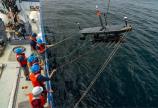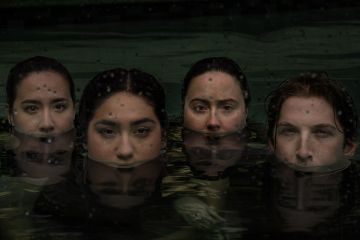Celebrating World Oceans Day 2023

The oceans inspire us.
For 60 years, multiple experiences of UVic students and researchers across disciplines have been shaped by the ocean. From a campus that’s a few short steps from coastline, our engagement with the global ocean has defined UVic research and its breakthroughs. And as we’ve spent decades exploring its magnificence, we’ve also increasingly recognized that it is threatened by change.
In the 1960s, UVic hypothermia research led to the development of Mustang lifesaving suits deployed across North America to keep those at sea safe. At the turn of the millennium, we began taking the first steps toward creating one of the top “big science” projects in the world, Ocean Networks Canada’s cabled ocean observatories.
This World Oceans Day, as humanity begins to recognize how we have put the health of the oceans at risk through human-made climate change, we celebrate the extraordinary abundance of its underwater ecosystem—and renew our pledge to better protect and restore it to full health. Here’s just a glimpse of how we at UVic are making a difference.
ONC recognized as an Ocean Titan
Ocean Networks Canada, an initiative of UVic, is one of 30 pioneers and change ambassadors who are featured in a global docuseries for charting new paths towards a healthy and sustainable ocean. Ocean Titans is an official World Ocean Council series that is hosted and distributed by Reuters internationally.

Kelp-encrusting bryozoans: a new threat to kelp health
UVic researcher Maycira Costa and her team are collecting data to inform scientists on environmental conditions conducive to kelp health and the presence of bryozoans, a colonial animal that grows on kelps.
No one left behind: equity in sustainable planning
With 40 per cent of the global human population living within 100 kilometres of the coast, we need to plan for sustainable coastal development. UVic School of Environmental Studies assistant professor Gerald Singh explores how.

Questioning the pteropod's status as a key bioindicator for the effects of ocean acidification
Thanks to a new study, UVic PhD student Matt Miller is questioning common beliefs about the sea butterfly’s shell dissolution and status as a bioindicator for future consequences of climate change.
New graduate program for future climate solution leaders
UVic biology professor Julia Baum's first-of-its-kind Coastal Climate Solutions Leaders program—launching this fall—will prepare graduate students to tackle the climate crisis head-on, thanks to UVic’s excellence in oceans and climate change research.
Photos
In this story
Keywords: People Place Planet, oceans, Indigenous, climate, environment, sustainability, technology, water, research, partnerships, clean energy, SDG13, SDG11, SDG14, biodiversity, SDGs faculty and staff, administrative, environment, health, education, partnerships, research, science, business, affordable and clean energy, life below water, community, climate action
People: Julia Baum, Gerald Singh, Matt Miller, Maycira Costa







